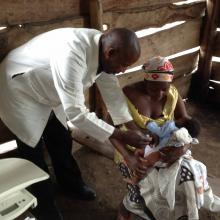tuberculosis
April 24-30 is World Immunization Week. While it is estimated that vaccinations save the lives of 2.5 million children every year, another 1.5 million children die each year from diseases that can be prevented with vaccines. Christian organizations are working to change this and help the global health community reach the 20 percent of children worldwide who miss out on life-saving vaccines.
Sylvia, a mother of three in Kasese, Uganda says she was aware of vaccines to prevent disease, but did not understand their importance or the fact that children need a number of vaccinations throughout the first five years of life. “All I understood was that there are killer diseases we should immunize our children against,” explained Sylvia. “I took my first and second child for vaccines for only the first nine months of life. I didn’t learn my children would still be at risk of catching diseases if they were not immunized for five full years until an educator from the Bishop Masereka Christian Foundation (BMCF) came to my village.”
Reaching parents with information about vaccines and vaccinating children is critical to child survival. Immunization is one of the main drivers behind the tremendous decline in child deaths the world has experienced in recent decades.
The Global Fund has a plan to win the fight against the three major diseases of poverty—and it's working.
In a move that surprised many in the world of economics and politics, on Friday morning President Obama nominated Jim Yong Kim, the South Korea-born physician, anthropologist and president of Dartmouth College, to be the next president of the World Bank.
Prior to taking the helm at Dartmouth in 2009, Kim, 52, led the global health and social medicine department at Harvard Medical School, of which he is a graduate. Widely considered one of the leading minds in world health, Kim also has served as a director of the HIV/AIDS department at the World Health Organization, where he focused on helping developing countries improve treatment and prevention programs.
Obama called Kim, “an innovative leader whose groundbreaking work to fight disease and combat poverty has saved lives around the globe.” The President said Kim is exceptionally well qualified for the position but brings “more to the role than an impressive record of designing new ways to solve entrenched problems.
“Development is his lifetime commitment, and it is his passion,” Obama said. “And in a world with so much potential to improve living standards, we have a unique opportunity to harness that passion and experience at the helm of the World Bank.”
This week, the Senate will vote on H.R. 2354, an appropriation bill that will determine the amount of funds we allocate for poverty-related development assistance. There are a number of amendments proposed that will severely cut this aid, which currently helps millions of the world's poorest and most vulnerable. The bottom 1 percent, if you will.
Right now, in cities around the world, there is a growing protest movement putting the issue of economic inequality squarely on the public agenda. Regardless how you feel about this movement, I believe there is another "99 percent" we need the G20 – and urgently Congressional leaders – to remember and prioritize.
Nearly 8 million children under the age of five die every year due to preventable malnutrition and disease. But they are not dying in the United States, Germany or here in France.
According to research by World Vision’s Child Health Now campaign, 99 percent of those entirely preventable deaths take place in developing countries. The 99 percent of the children that die under the age of 5 are too often invisible and don't have a voice at major global summits such as the G20 or in the corridors of Congress. These children constitute the real and too often forgotten 99 percent.
Growing up in the Bible belt in east Tennessee, I can remember an entire campaign built around "What Would Jesus Do?" There were WWJD bracelets, stickers, and T-shirts everywhere.




